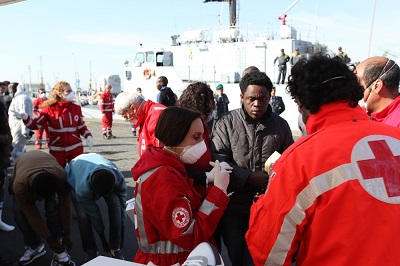Statement on behalf of the Red Cross National Societies in the European Union and Norway
The death of hundreds of migrants in the Mediterranean last week is a humanitarian disaster that has shocked and saddened us all. It has also drawn renewed attention to the tragedy that is unfolding before our eyes, day after day, as those fleeing conflict, persecution or poverty take increasingly dangerous routes to seek protection and a better future. People in desperate situations will continue to take hazardous roads and put their lives at risk when they have no other options – despite all efforts to stop them.
We must now all work together to ensure such tragedies will not happen again, and put a halt to the indifference that is turning the Mediterranean into a vast graveyard. Preventing further loss of life is an absolute priority, a humanitarian imperative, and we welcome the commitment by European leaders to increase the search and rescue possibilities of FRONTEX, but it is not enough. A dedicated EU search and rescue operation covering the entire Mediterranean needs to be set up. Every time a boat sinks a part of our humanity drowns.

Let us not forget that according to the EU Charter of Fundamental Rights "the Union is founded on the indivisible, universal values of human dignity, freedom, equality and solidarity; it is based on the principles of democracy and the rule of law.” Authorities in the EU therefore have a fundamental duty to respect human dignity and to support effective access to basic human rights. We stress the importance of guaranteeing the dignity of all migrants and their families by upholding their right to know about the fate of their loved ones, to access services for restoring family links, while also respecting their right to privacy.
We believe that Europe can also do more to offer safe and legal ways to enter the EU and access protection from conflict and violence. Resettlement of refugees is an effective instrument but current numbers remain too low. Acting together, Member States should aim to resettle at least 20,000 refugees per year by 2020. Exemption from visa obligations for people fleeing conflict could also be considered as an option.
Several Member States must be commended for showing moral leadership in issuing visas on protection grounds as well as supporting protection-sensitive family reunification procedures for those torn apart by conflicts in Syria and elsewhere. Their example deserves to be followed by others who are yet to do so, with every Member State acting in fullest European solidarity. In addition, current pressures on Member States at external borders illustrate that the Dublin system, which characterises the Common European Asylum System, is not satisfactory and requires review. Effective solidarity mechanisms should be developed to ensure a more equitable distribution of refugees and asylum seekers across the EU.
The new European Agenda on Migration currently being developed needs to be bold, forward-looking, and firmly based on the principles of humanity, solidarity – both within Europe and with countries of origin and transit - and respect for human rights. This should include a renewed commitment to tackle the root causes of forced migration, be they conflict, violence or oppressive poverty.
With our global network we stand ready to work with governments on the implementation of concrete actions in support of migrants in a vulnerable situation, to contribute to humanitarian efforts in the short term and to the longer-term integration of those who have turned to Europe for protection and safety.
Learn about our position on legal avenues to access international protection in the EU
Find out more about access to international protection in the EU for people fleeing Syria
For media inquiries, please contact Eva Oyón on: eva.oyon@redcross.eu or +32 2 235 09 22

